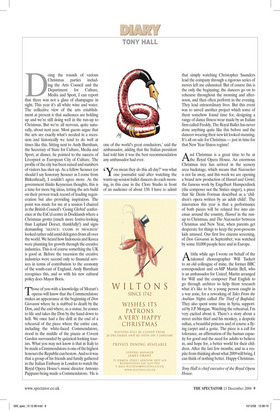D oing the rounds of various Christmas parties including the Arts
Council and the Department for Culture, Media and Sport, I can report that there was not a glass of champagne in sight. This year it’s all white wine and water. The collective view of the arts establishment at present is that audiences are holding up and we’re still doing well in the run-up to Christmas. But we’re all nervous, quite naturally, about next year. Most guests argue that the arts are exactly what’s needed in a recession and historically we tend to do well at times like this. Sitting next to Andy Burnham, the Secretary of State for Culture, Media and Sport, at dinner, he pointed to the success of Liverpool as European City of Culture. The profile of the city has been raised and numbers of visitors has shot up. As a fellow Scouser (or should I say honorary Scouser as I come from Birkenhead), I couldn’t agree more. As the government thinks Keynesian thoughts, this is a time for more big ideas, letting the arts build on their proven track record of leading regeneration but also providing inspiration. The point was made for me at a session I chaired in the British Council’s ‘Going Global’ conference at the ExCel centre in Docklands where a Christmas grotto (much more festive-looking than Lapland Dorset, thankfully!) and signs demanding ‘siLENcE: Ems iN pRoGREss’ looked rather odd amid delegates from all over the world. We heard how Indonesia and Korea were planning for growth through the creative industries. This is of course something the UK is good at. Before the recession the creative industries were second only to financial services in terms of contribution to the economy of the south-east of England. Andy Burnham recognises this, and so with his new cultural policy does Mayor Boris.
Those of you with a knowledge of Mozart’s operas will know that the Commendatore makes an appearance at the beginning of Don Giovanni where he is stabbed to death by the Don, and the end where, as a statue, he comes to life and takes the Don by the hand down to hell. We once had a fire drill at the end of a rehearsal of the piece where the entire cast, including the white-faced Commendatore, stood in the middle of the piazza at Covent Garden surrounded by quizzical-looking tourists. What you may not know is that in Italy to be made a Commendatore is one of the highest honours the Republic can bestow. And so it was that a group of his friends and family gathered in the Italian Embassy in London to watch the Royal Opera House’s music director Antonio Pappano being made a Commendatore. ‘He is one of the world’s great conductors,’ said the ambassador, adding that the Italian president had told him it was the best recommendation any ambassador had ever.
‘You mean they do this all day?’ was whatone journalist said after watching the warm-up session ballet dancers do each morning, in this case in the Clore Studio in front of an audience of about 150. I have to admit that simply watching Christopher Saunders lead the company through a rigorous series of moves left me exhausted. But of course this is the only the beginning; the dancers go on to rehearse throughout the morning and afternoon, and then often perform in the evening. They lead extraordinary lives. But this event was to unveil another project which some of them somehow found time for, designing a range of dance fitness wear made by an Italian firm called Freddy. The Royal Ballet has never done anything quite like this before and the dancers wearing their new kit looked stunning. It’s all on sale for Christmas — just in time for that New Year fitness regime!
And Christmas is a great time to be at the Royal Opera House. An enormous Christmas tree has arrived in the scenery area backstage, which means that Nutcracker is not far away, and this week we are opening a brand new production of Hansel and Gretel, the famous work by Engelbert Humperdinck (the composer not the Sixties singer), a piece that Sir Denis Forman described as a ‘children’s opera written by an adult child’. The innovation this year is that a performance of both pieces will be relayed live into cinemas around the country, Hansel in the runup to Christmas, and The Nutcracker between Christmas and New Year, when parents get desperate for things to keep the post-presents kids amused. Our first live cinema screening, of Don Giovanni in September, was watched by some 10,000 people here and in Europe.
Alittle while ago I wrote on behalf of the talented choreographer Will Tuckett to an old colleague of mine, the former BBC correspondent and ex-MP Martin Bell, who is an ambassador for Unicef. Martin arranged for Will and the composer Paul English to go through archives to help them research what it’s like to be a young person caught in a war zone, for a reworking of Tales From the Arabian Nights called The Thief of Baghdad. They also spent some time in Syria, supported by J.P. Morgan. Watching the rehearsal, I’m very excited about it. There’s a story about a street urchin thief and his monkey, a despotic sultan, a beautiful princess and of course a flying carpet and a genie. The piece is a call for tolerance, an affirmation of the human capacity for good and the need for adults to believe in, and hope for, a better world for their children. After the last few months, and as a respite from thinking about what 2009 will bring, I can think of nothing better. Happy Christmas.










































































 Previous page
Previous page